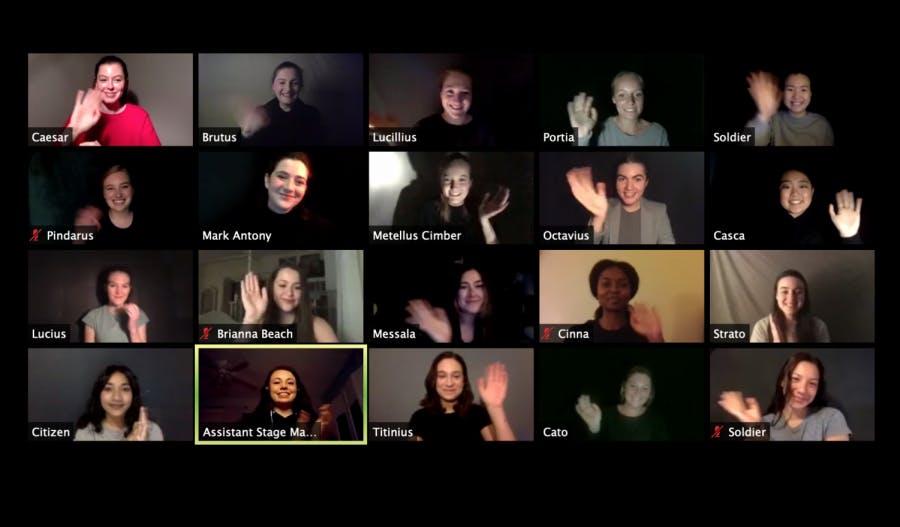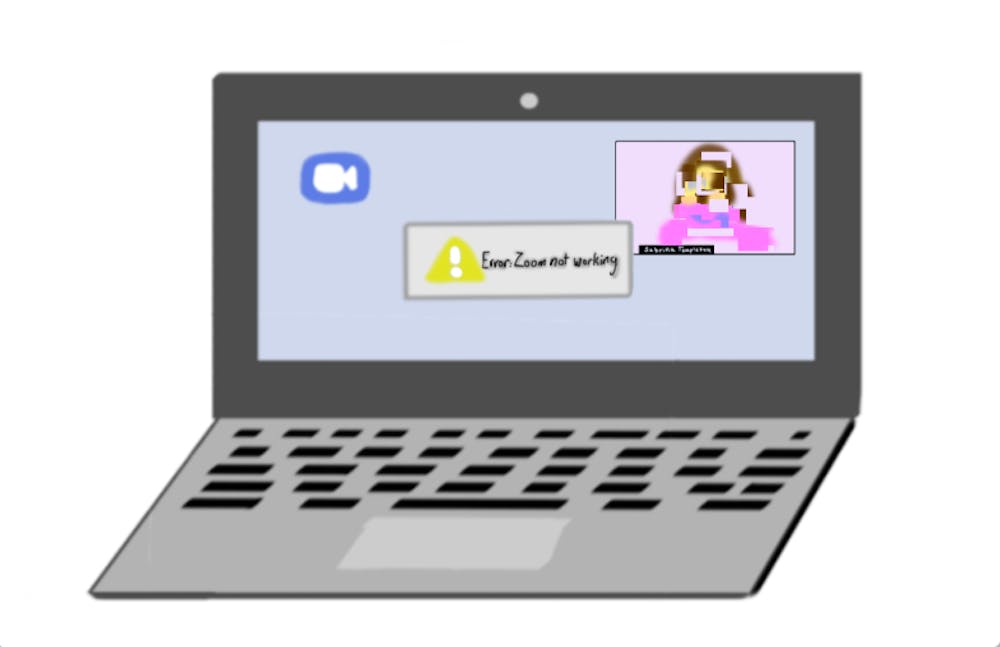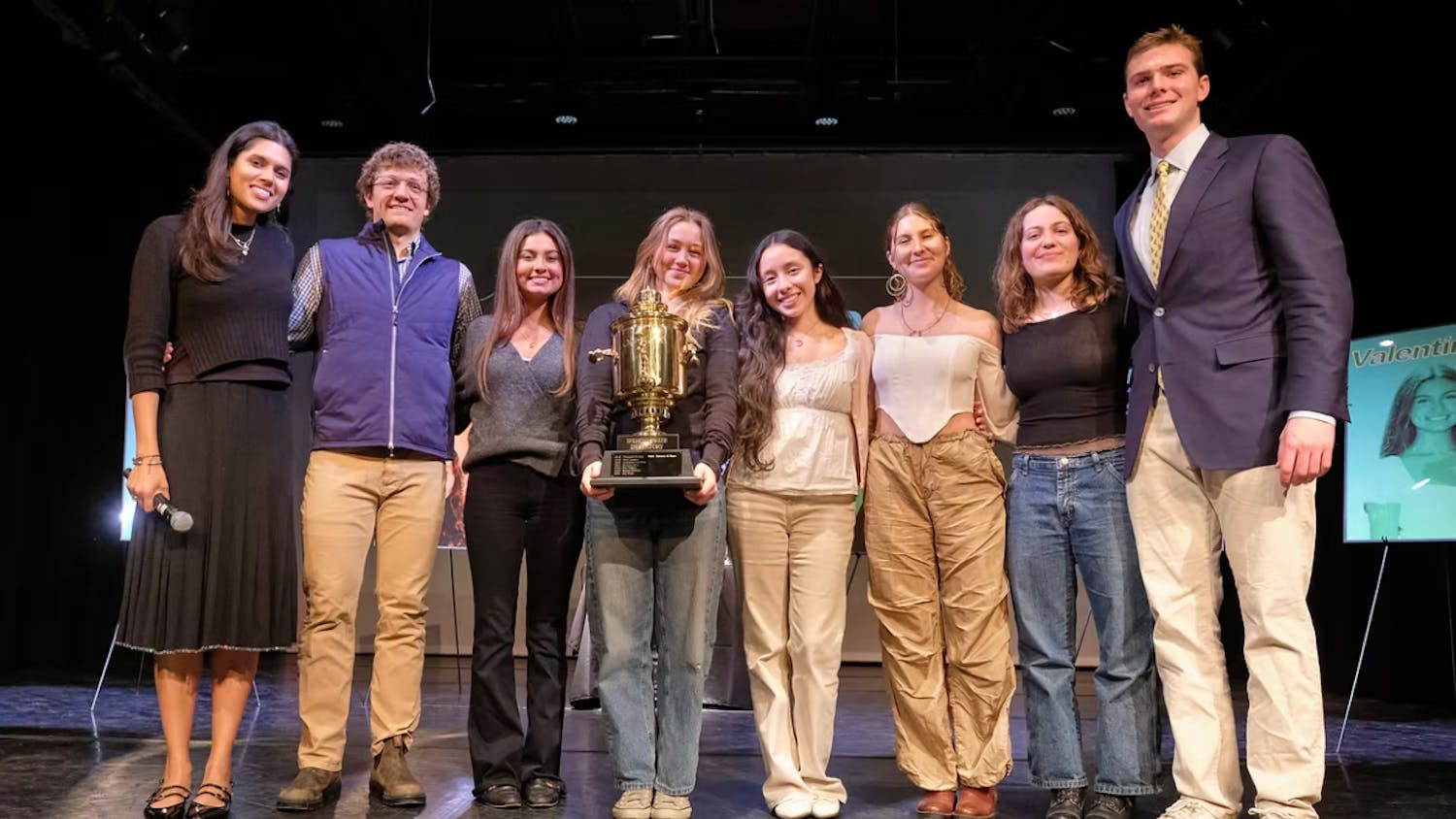From a virtual two-hour performance of "Julius Caesar" to a museum tour accessible from your home, the college has transformed its interaction with technology since Covid-19 spurred the transition to remote learning. Behind it all is the Information Technology Services (ITS) team, which has been working tirelessly to ensure smooth technology access for the college community.

"Julius Caesar" was performed over Zoom last week with the help of ITS.
As the world adjusted to the crisis in early March, the college’s technological infrastructure was well-prepared. Many resources already take place online, such as Webmail, OneDrive, and Canvas. During the two-week spring break, ITS worked to engage with online vendor partners, and updated licenses to meet the growing need.
Even with those existing services, Vijay Menta, associate vice president and chief information officer for ITS, shared that home internet access has been a significant issue for the community. Faculty and staff residing in rural Vermont have experienced connection instability. To respond, the ITS team has put forward best practices to suggest improvements and contacted home internet providers to stay updated.
Prior to Covid-19, the college had 80 VPN users per day. Now it has 500 VPN licenses, peaking at just over 300 concurrent users per day—an increase of 300%. By the end of spring break, these measures were put in place for users.
Another major concern for the ITS is internet equity for the community.
“We were working on this (internet equity) from the very beginning, because we knew there will be students who don’t have the full internet access that is needed,” Menta said. “We have a program in place where we can recommend students to the student financial services for help.”
The department also recommended that professors remain flexible with students and adopt an asynchronous mode of learning. The department has loaned around 80 laptops, webcams, headphones and other accessories to students.
The financial needs behind these decisions were immediately approved by President Laurie Patton and the cabinet. There was also a savings offset as travels to conferences and professional developments were canceled, and the money was used to purchase VPN licenses in response to growing need. ITS also accelerated its planned laptop purchases, to ensure sufficient inventory in stock for anyone who requests them.
Virtual learning posed other challenges for academic instruction, and ITS partnered with Digital Learning & Inquiry (DILINQ) to work on innovating modes of learning.
“We’re trying to do as much as possible in a virtual manner, and if we notice something is needed for students to learn in a different way, we are able to look into those opportunities to see if we can provide that assistance too,” Menta said.
Not surprisingly, Zoom is the most popular service ITS has implemented during the transition remote learning. Prior to Covid-19, the college hosted roughly 700 Zoom meetings per week. In contrast, 8,000 Zoom meetings have been held since May 1. On a typical day this May, there are 500 meetings per day on a weekend and between 1,250 and 1,500 meetings on a weekday. The college currently owns 6,000 Zoom licenses, and has added 3,300 new users since early March, when it already had 2,600 active users.
“Not only are we prepared to use Zoom, ITS is prepared to use alternative devices such as [Google Meet] and [Microsoft Teams] if backup is needed,” said Menta.
One way ITS supports virtual learning is through the help desk Zoom room. Traditionally, ITS help desk has staff and student helpers located in the Davis Library on campus. Now, this service can be accessed via Zoom.
Checko Mkocheko ‘22 worked at the help desk on campus and continues to do so from home. Mkocheko feels fortunate that the help desk is one of the few jobs that can go fully online, and he receives compensation as he did prior to Covid-19.
“I do not deal with personal computers, network issues, printing issues, software issues and classroom support anymore. I help clients mainly on credentials and accessing college online resources,” said Mkochecko.
Menta warned that there has been an increase in phishing attacks since Covid-19, with people posing as genuine organizations to compromise users’ accounts.
“I want people to be very vigilant about this, and when in doubt, when you don’t recognize the sender’s email, please make sure you contact infosec@middlebury.edu, which will help you protect in the long run and keep our data safe and secure,” Menta said.
But with new multi-factor authentication in place, Menta is confident in the college’s internet security.
The workload for ITS has been high as members of the team act in support of many members of the community. On top of the Covid-19 response, ITS is also planning to go live with its Oracle implementation as part of the Green Mountain Higher Education Consortium initiative. While other projects are on hold, regular maintenance, security, and upgrades must go on.
“As the leader of the group, one of the things I make sure is to categorize our tasks into must-do, important, and defer,” Menta said. “We need to better prioritize to make sure we are helping the community on Covid-19 responses and remote learning first. We are in a much more steady place now than we were in March.”
Menta expressed gratitude for his team, and their partners at the college, including DLINQ, communications and marketing, and other departments to make sure services are delivered. He is thankful that students and faculty have been working patiently with ITS, and emphasized that they are here to help with any questions.
Technology services step up to make remote learning happen

Sabrina Templeton
BENJY RENTON
Comments



